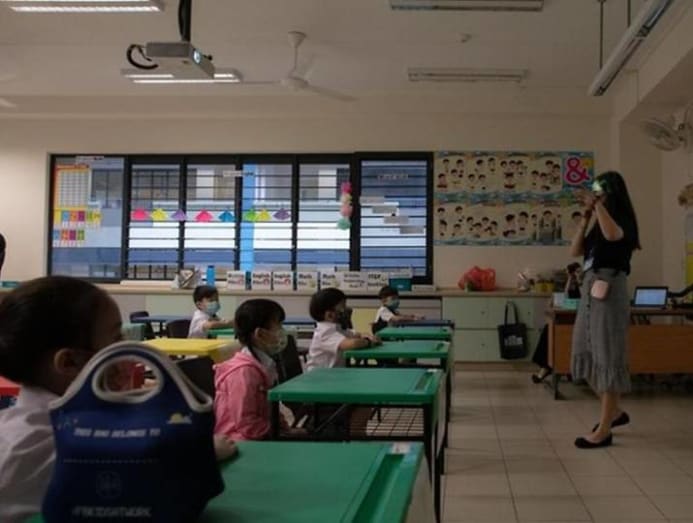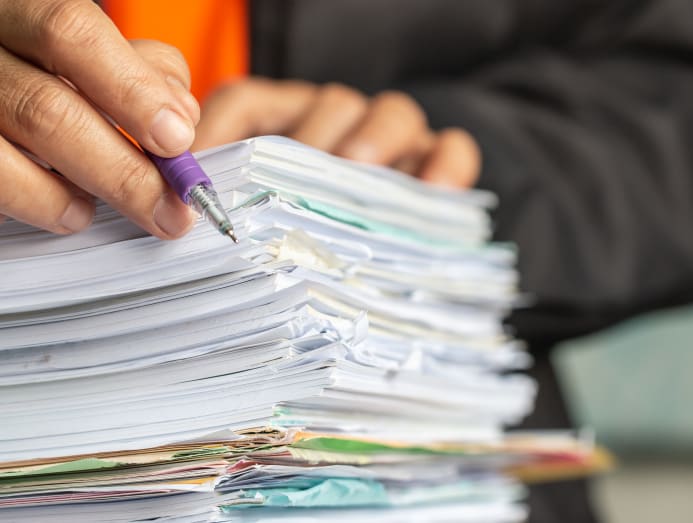Commentary: Teachers who complain about burnout are not bad teachers
Psychology tells us it’s natural but wrong to assume teachers aren’t coping well with stress due to their own inability to manage time or be tough, say SMU’s Tang Bek Wuay and Jacinth Tan.

Some teachers are struggling to seek help for their mental health. (File photo: iStock)
SINGAPORE: Singapore workers are no strangers to burnout. After all, we live and work in the second most overworked city.
A worrying spotlight was recently shone on burnout among teachers. In a Ministry of Education (MOE) engagement survey conducted in June, three in 10 teachers said they could not cope with stress at work.
Many of us have family or friends in the teaching profession. While it is not uncommon to hear of their challenges and high workload, some report experiencing panic attacks, emotional breakdowns or feeling like they have nothing to contribute. One teacher we know eventually chose to quit to protect their mental health.
WHY ARE TEACHERS SO BURNT OUT?
Burnout has been studied for decades in psychology. It is a response to cumulative, prolonged and sustained stress, not the “usual” episodic stress we may feel before an important exam or job interview.
It has three distinct components: Initial feelings of being emotionally and mentally drained, followed by cynicism about the meaning of one’s work and an overwhelming sense of inadequacy.

Job demands on teachers have increased dramatically. According to one retired teacher, heading home by 3pm was the norm 25 years ago.
According to the Organisation for Economic Cooperation and Development (OECD), Singapore teachers reported working 46 hours per week on average in 2018 – or seven hours more than the OECD average.
Work doesn’t usually stop when they get home, with assignments to grade and the next day’s lessons to prepare.
Teachers also have to plan events, organise co-curricular activities, discipline and counsel students, provide “customer service” to parents or in some cases, act as “surrogate parents”.
Amid the COVID-19 situation, teachers have also stepped into roles of mental health counsellors, safe distancing ambassadors and multimedia content creators for home-based learning.
That said, a demanding job alone does not lead to burnout, though its effects are often worsened by the lack of resources to cope.
Two key complaints from teachers have been the expectation that they should cope with stress on their own and the feeling that they have been “exploited for their passion”, after experiencing school leaders dismiss their concerns and attribute these as a result of bad time management or a lack of job commitment.
ONUS OF MANAGING BURNOUT NOT SOLELY ON TEACHERS
A well-studied phenomenon in psychology is the “fundamental attribution error”, where we over-attribute behaviours or outcomes to the person rather than the situation.
There is a natural tendency to assume teachers aren’t coping because they don’t plan their time well or are not “mentally tough enough”.
We often have high expectations for teachers to just grin and bear with job demands “for the students”.
But just as rubber bands don’t snap on their own unless overstretched, teachers do not simply “snap” unless situational demands place an unreasonable toll on them. Assuming teachers can cope by themselves may send them down the spiral of self-blame and worsening mental health.
Where burnout is due to a lack of resources, providing support and skills to balance job demands will help to shore up resilience.
This can include better assistance and training to lower the barriers for remote teaching while teachers build up necessary skills and confidence.
Class sizes could be reduced if there are enough teachers to go around. According to MOE, the average primary and secondary school class size was 33 in 2019, compared to the OECD average of 21 for primary and 23 for lower secondary levels in 2018.

Non-teaching tasks can be minimised or outsourced. Research shows that work tasks perceived as unnecessary or outside of a job scope can reduce the sense of living a calling and increase stress.
Teachers can also be given more space to do their jobs or participate in areas of interest at school. We know having a sense of autonomy can protect against burnout, as more control means employees can better manage their workload and pursue tasks that add meaning to work.
Where burnout is an issue of insufficient mental health support, resources and counsellors should be equally accessible to teachers as they are to students. While this may not translate to improvements in workload, counselling may help teachers pinpoint problems causing disproportionate stress and find better ways to cope.
THE ROLE OF SUPERVISORS AND SCHOOL LEADERS
What is the role that department heads, vice-principals and principals should play? In any work environment, managers should provide psychological safety for employees to voice their struggles.
School leaders could do better in creating safe spaces where teachers can communicate challenges and seek help. These in turn can provide valuable feedback on morale and promote a supportive work culture.
Concerns that validating the experience of stress could intensify negative work sentiments can be problematic. We are much better at problem-solving when the problem is not us.
One core principle worth keeping in mind when supporting our teachers should be: “The person is not the problem, the problem is the problem.”
We should not underestimate the impact of showing empathy, acknowledging teachers’ burden, validating emotions and providing the mental space they need.
Psychology also tells us people prefer relationships that are roughly equal in costs and rewards. Teachers, like any other professionals, expect to be rewarded commensurate to the time and energy devoted to students.
While ultimately MOE has the key role in shaping policy, especially in performance management and career progression, school leaders should look into providing more recognition and social rewards - in giving credit where it is due and showing that hard work has been recognised and is appreciated.
To do so, school leaders need to be on the ground and have a keen impartial view of teachers’ efforts.
When necessary, supervisors should negotiate with school leaders to adjust expectations or manpower support. But where change is not immediately possible, supervisors should still try to provide some help on their end and check in frequently with how teachers are coping.
Mental health has become a key issue in Singapore schools since the River Valley High School incident but do the measures go far enough? We hear from a parent, a counsellor and Minister of State for Education Sun Xueling on CNA's Heart of the Matter:
WORK IS A MEANS TO AN END, EVEN FOR TEACHERS
This is not to say that empathy and kind words alone are sufficient to address burnout among teachers. Addressing the root cause of the problem would require school leaders to be part of the solution and champion for more structural changes to improve the workplace.
Work is a means to an end, be it altruistic ones like nurturing the next generation or personal ones such as providing for their family.
Teachers who complain about burnout or stress are not bad teachers. On the contrary, many of them get stressed because they care. So when they quit, schools and students are worse off for it.
Let’s not make teachers choose between their own well-being and caring for students.
Tang Bek Wuay is a PhD candidate in psychology and Jacinth Tan is an assistant professor of psychology in the School of Social Sciences, Singapore Management University.














